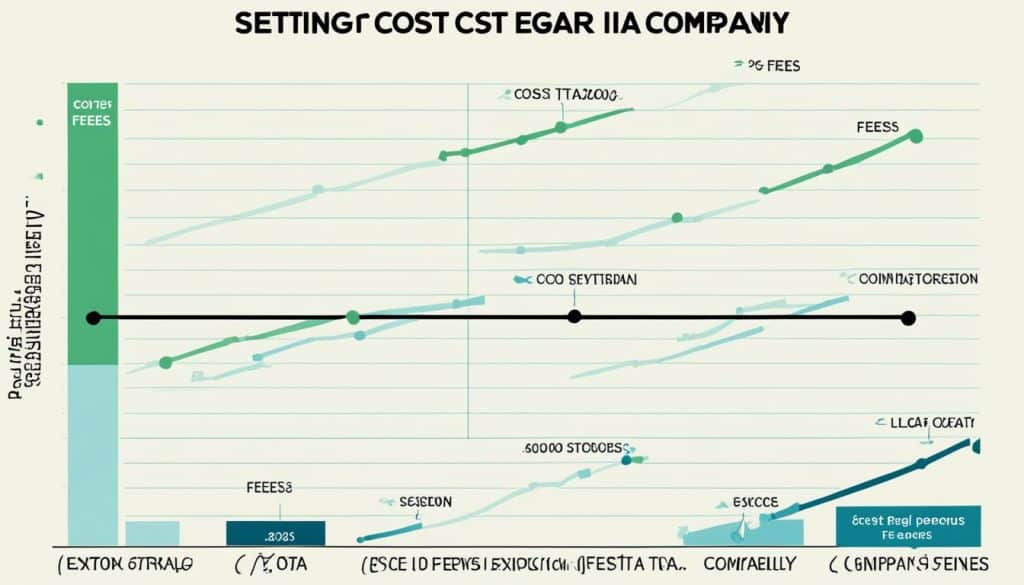Starting a business in Italy involves understanding the costs. It’s for those thinking of starting up and those already running a business. To start and run a business in Italy, you might spend about 5000 to 8000 euros at first. Then, it costs around 1850 euros each year to keep it going. The main costs are for setting up the company, registering it, and trademarking.
- Introduction to Setting Up a Company in Italy
- Overview of Initial Costs for Company Formation
- The Importance of a Local Office Address
- Virtual Office Requirement Expenses
- Accounting and Bookkeeping Costs
- Licences and Permits Necessary for Business Operation
- Registering with the Tax Authority in Italy
- Opening a Business Bank Account in Italy
- Depositing the Minimum Share Capital
- Registering for Social Security
- Monthly and Annual Maintenance Costs
- Cost to set up a company in Italy
- Forming a Sole Proprietorship in Italy
- Establishing a Branch Office in Italy
- Choosing the Right Business Structure
- Additional Considerations for Non-Residents
- Engaging Professional Services for Company Formation
- Source Links
There are also costs for keeping a physical or virtual office. Plus, you need accounting services. Following tax and social security rules also adds to the expenses.
Key Takeaways
- Initial expenses for company formation in Italy are around 5650 euros.
- Annual maintenance costs for setting up an Italian business are approximately 1850 euros.
- Company incorporation and Trade Register fees are significant initial costs.
- Trademark filing is essential for business registration costs in Italy.
- Ongoing expenses include physical or virtual office maintenance, accounting, and compliance with tax and social security regulations.
Introduction to Setting Up a Company in Italy
Setting up a company in Italy attracts entrepreneurs worldwide. The business environment is very welcoming. Starting a business in Italy looks appealing for this reason. A well-prepared Italian company setup guide can make the process smoother.
Starting a business in Italy takes a lot of thought. Planning and budgeting are key. You’ll need to consider registration costs, licences, and unexpected expenses. The regulatory system supports businesses, but it’s wise to be ready for surprises.
A detailed Italian company setup guide is vital. It covers every step, ensuring you meet regulations and legal needs. This keeps operations running smoothly and helps avoid financial setbacks.
If you’re starting a business in Italy, knowing the setup process is essential. Having the right knowledge and resources increases your chances of success. Italy offers a dynamic economic environment for your business.
Overview of Initial Costs for Company Formation
Italy is a great place to start a business. But, setting one up comes with initial costs. These include fees for incorporation, trade registration, and trademarking.
Company Incorporation Expenses
In Italy, starting your company costs about 2300 euros. This pays for important steps and services. They help you legally set up your business.
Trade Register Expenses
Registering with the Trade Register costs around 520 euros. It’s important for legally operating your business. It also puts your business on Italy’s official registry.
Trademark Registration Fees
Trademarking starts at 200 euros for one product category. More categories mean an extra 34 euros each. This is crucial for protecting your brand and its long-term success.
The Importance of a Local Office Address

Having a local office address in Italy is more than just following rules. It’s a key step that impacts how your business runs and how people see it. The registered office requirement Italy means your business must have a real spot within the country. This is essential for receiving official mail and messages.
Setting up a company address Italy involves choosing to buy or lease space. This decision is a major part of your starting costs. Let’s explore why this is so important for your business.
Buying a place for your business comes with costs like research, legal fees, and fixing up the space to meet your needs. On the other hand, leasing can give more flexibility, which is great for new businesses.
- Purchase Costs: Legal fees, property taxes, and renovations
- Rental Expenses: Monthly rent, deposits, and service fees
The need for a registered office requirement Italy is key for obeying the law and talking to government agencies. Having a proper company address Italy also boosts your business’s image and trustworthiness. This makes it a smart investment for your future success.
Virtual Office Requirement Expenses
For businesses in Italy, having a physical office can be quite expensive. Luckily, virtual office services Italy offer a cheaper solution for a business address. These services usually cost about 100 euros each month. They are a great option for startups and small companies.
Virtual office services Italy give you a registered business address without renting actual space. This deeply cuts overhead costs and keeps you in line with local business laws. For entrepreneurs seeking an affordable business address, virtual offices are key. They provide flexibility and professional perks without the high costs of traditional offices.
By choosing virtual office services Italy, firms can keep a prestigious address, carry out key operations, and handle mail effectively. This not only reduces costs but also builds a professional image. A solid image is vital for winning customer trust and enhancing business credibility.
In short, picking virtual office services Italy is a smart move for any business aiming to cut costs. It offers a reputable and cost-efficient business address. This option is perfect for startups or growing companies, making operations smoother without the heavy cost of normal office rent.
Accounting and Bookkeeping Costs
Starting a business in Italy means paying close attention to your accounts and books. This is vital for sticking to financial rules and keeping things running smoothly. It’s important for business owners to think about these costs when planning their finances.
Monthly Accounting Fees
Monthly accounting fees in Italy start at 130 euros. But, the real cost can change a lot. It depends on how many invoices you have and your yearly income.
The price of accounting services changes with your business’s financial activities. No matter if you’re just starting or already expanding, the fees adjust to fit your accounting needs. This helps in managing your finances accurately.
Annual Financial Statements
It’s very important to prepare and submit yearly financial statements. This process involves thorough record-keeping, audits, and necessary paperwork. It’s not just a rule but also helps in staying clear and following financial laws.
The cost for this can vary based on your industry and company size. This means each business will have its own specific costs for this essential task.
Licences and Permits Necessary for Business Operation

When setting up your business in Italy, getting the right business licences and permits is crucial. The needs and costs vary based on what your business does.
For basic business tasks, you’ll need a trading licence. This is different from permits for specific areas like the food and beverage sector. There, health and safety permits and hygiene certificates are a must.
If your business affects the environment, for example manufacturing, more permits are needed. These can be expensive and are tied to following environmental laws.
- Retail businesses: May need local municipal permits and trading licences.
- Healthcare services: Require registrations with health authorities and compliance checks.
- Construction companies: Must obtain operational authorisations and safety permits.
Operational permits and costs mean you’ll pay application fees first. Then, there are charges for renewing them regularly. Keeping track of renewal times is key to avoid business disruptions. Staying on top of these regulations is crucial for being compliant and maintaining a good business image in Italy.
Registering with the Tax Authority in Italy
Starting a business in Italy means you must register with the tax authority. This step is key to making sure your business follows all the tax laws. Firstly, get a VAT number to comply.
Obtaining a VAT Number
Getting a VAT number is a must for businesses in Italy. It’s needed for registering for VAT, billing clients, getting VAT credits, and VAT returns. You must give specific documents to the tax offices, and the details can change based on your business type and what it does.
Tax Compliance Costs
After getting your VAT number, you must keep up with tax rules. The costs start with the registration fees. Then, there are extra costs. These include maintaining records, submitting VAT returns, and following Italy’s tax laws. The costs vary depending on how big your company is, its earnings, and the industry it’s in.
Opening a Business Bank Account in Italy
Opening a business bank account in Italy is important for managing finances well. Finding the right bank can be hard because fees vary between banks. When you open a corporate bank account Italy, you face different costs like keeping the account and paying for transactions.
Having a corporate bank account Italy does more than just handle day-to-day money matters. It lets you manage expenses, pay suppliers, and get payments from customers. It’s key to know about all fees, so there are no surprises. Businesses might pay for monthly upkeep, transaction costs, and extra services like online banking.
Also, some businesses must have a corporate bank account by law. It’s good for building a credit history and showing financial trustworthiness. Knowing about business banking fees helps in better financial planning. Banks like Intesa Sanpaolo and UniCredit have special offers, so looking into those is smart.
In the end, choosing the right bank and knowing the fees can help a company’s money matters and efficiency in Italy.
Depositing the Minimum Share Capital
Putting down the minimum share capital is key to starting a business in Italy. The amount needed varies by the type of company. It could be a limited liability company (S.R.L) or a joint-stock company.
Minimum Share Capital for an S.R.L
The lowest share capital for an S.R.L in Italy ranges from 1 euro to 10,000 euros. This money must be paid fully when joining to meet the S.R.L capital needs. This rule helps small businesses and startups begin with less money.
Minimum Share Capital for a Joint Stock Company
In contrast, a joint-stock company needs more money to start. They must have at least 50,000 euros, and 25% of this should be paid when the company begins. This big initial amount makes sure the company starts strong.
Registering for Social Security
Signing up for social security is crucial when starting a business in Italy. All companies need to follow national rules by joining the National Institute for Social Security (INPS). This action, known as social security registration Italy, makes sure businesses look after their workers’ welfare and benefits.
The steps to INPS registration for companies include giving detailed info about the business. This means telling them about the legal setup, how many people work there, and what the business does. Getting this done right avoids legal problems and helps the business run smoothly.
Employers have to pay into the INPS for their workers. These payments go towards pensions, unemployment help, and maternity leave. How much they pay depends on the worker’s wage and the type of business.
By following social security registration Italy, businesses show they care about their workers. It confirms to employees that they will get their rights. It also shows the company’s dedication to their wellbeing.
So, proper INPS registration for companies is a must not only by law. It’s also key to building a trustworthy and open business culture in Italy.
Monthly and Annual Maintenance Costs
Running a business in Italy means planning for costs beyond just setting up. Among these ongoing business expenses Italy has, monthly and yearly fees are crucial. They ensure the business meets all rules and runs smoothly.
These maintenance costs cover several areas:
- Recurring licensing fees vary by industry and business size.
- Contributions to INPS, key to the Italian social security system, helping both employers and employees.
- Regular accounting services keep companies right with financial and tax rules, starting at 130 euros a month.
These annual maintenance fees for companies are vital for staying legally compliant and operationally efficient in Italy. It’s important for companies to set aside enough money to cover these ongoing costs.
Also, keeping accurate financial records and submitting financial statements on time is crucial. It helps to dodge legal issues in Italy. Making sure there’s budget for these ongoing costs is a must.
Cost to set up a company in Italy

Setting up a company in Italy means you’ll deal with initial fees, office expenses, and taxes. It also includes share capital and paying for professional services. To manage costs well, you need a solid budget plan.
First, you’ll pay for the company’s registration and all necessary licences. Then, you have to find an office. This could be a physical place or an online space. Remember, there are also ongoing costs. Things like accounting fees and social security payments add up over time.
To keep expenses under control, planning and budgeting are key. You should think about every cost, from start-up fees to daily expenses. This helps create a realistic budget. Understanding the full range of costs is crucial to building a successful business in Italy.
Forming a Sole Proprietorship in Italy
Starting a business in Italy as a sole proprietor is a great choice for simplicity and low cost. The process of sole trader registration Italy includes some important costs and steps.
- VAT Number Registration: Getting your VAT number is a major expense for a sole proprietorship.
- Business Register Fees: You must register with the business register, which has its own fees vital for legal operations.
- Social Security Registration: You need to sign up for social security as per national laws. This involves paying fees to organisations like INPS.
- Insurance Fees: It’s essential to protect your business with the right insurance, which costs money.
- Banking Charges: Starting a dedicated business bank account and adding the necessary capital incur banking fees.
Following these steps makes sure your business follows the law and is ready to succeed. Planning and budgeting for these sole proprietorship costs helps lay a strong base for your business venture in Italy.
Establishing a Branch Office in Italy
Starting a branch office in Italy needs careful planning. You’ll face various costs and requirements, which are key to consider. Understanding these early helps make setting up successful.
Initially, you must register the branch. This involves a one-time fee and ongoing reports to the Italian Business Register. These costs are not too high but are vital for legal recognition.
Finding an office space is a big step. The cost depends on the location and size. Expect higher prices in cities like Milan and Rome, which might be essential for strategic reasons.
Next, open a business bank account. The fees vary by bank. A local account is important for managing money, including income and spending.
You also need to register with the government and get tax IDs. This means getting a fiscal code and a VAT number. Plan for these tax costs to avoid surprises.
Every year, you will pay for accounting services. These are needed to keep finances in line with Italian laws. Regular accounting helps manage money and follow local rules.
In conclusion, setting up a branch in Italy means dealing with several costs. These range from registration and getting an office to banking and taxes. Proper planning for these expenses leads to a smooth start in Italy.
Choosing the Right Business Structure

Understanding Italian business structures is crucial. They influence your operation, finances, and taxes. The right choice impacts liability, flexibility, and success. Options like an S.r.l., Joint Stock Company, Partnership, or Cooperative cater to varied needs.
Limited Liability Companies (S.r.l.)
The S.r.l. is favoured for its flexibility and limited liability. S.r.l. benefits include protection of personal assets as shareholder liability is limited to their investment. It’s great for small and medium businesses due to a low capital requirement.
Furthermore, the S.r.l. has a flexible management structure. This boosts operational efficiency.
Joint Stock Companies
Joint Stock Companies suit larger businesses or those looking to go public. They require more capital but offer credibility and attract investors. Investors enjoy limited liability and can easily transfer shares.
This option allows for expansion and funding through share sales. It provides scalability and corporate formation options.
Partnerships and Cooperatives
Partnerships and cooperatives are common in Italy too. Partnerships fit professional firms with shared profits, losses, and liabilities. Meanwhile, cooperatives support mutual aid, often seen in agriculture and small manufacturing.
These models encourage teamwork. However, they might bring more personal liability and shared duties.
Additional Considerations for Non-Residents
Italy offers many chances for non-residents to set up businesses. But, knowing the specific needs for legal compliance is key. Getting the right permits and licences is a critical first step in forming an expatriate company.
The main costs for setting up a non-resident business in Italy include following local business laws and other procedural expenses that might pop up. Important points to consider are:
- Getting an Italian visa or residence permit meant for business.
- Learning about the complex laws that govern non-resident businesses.
- Making sure communication is smooth with local authorities to avoid legal issues.
The costs can change a lot depending on your business’s size and type. Entrepreneurs need to think about possible expenses in forming a company abroad. These could include paying for advice, legal help, and setting up an office in Italy to run things well.
Engaging Professional Services for Company Formation
Starting a business in Italy comes with many legal challenges. Firms like LEXIA Avvocati are key for smooth company formation. They guide through complex laws and requirements.
Though hiring experts like lawyers might seem expensive, their help is priceless. They prepare crucial documents, handle trademark matters, and make sure you follow all Italian laws. This speeds up your start-up and reduces legal risks.
Understanding the cost of such professional advice is important. Prices can range widely based on your business’s needs. However, investing in a respected advisory firm ensures your business has a strong legal base. This brings peace of mind.













